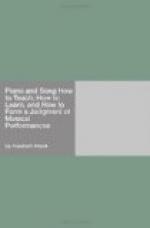We supply the want of all these by the following little rule:—
Three trifles are essential for a good piano or singing-teacher,—
The finest taste,
The deepest feeling,
The most delicate ear,
and, in addition, the requisite knowledge, energy, and some practice. Voila tout! I cannot devote myself to the treatment of the throat, for which I have neither time not fitness; and my lady singers are so busy with the formation of true tone, and in attention to the care and preservation of their voices, that they only wish to open their mouths for that object, and not for anatomical purposes. In piano-playing also, I require no cutting of the interdigital fold, no mechanical hand-support, no accelerator for the fingers or stretching machine; and not even the “finger-rack” invented and used, without my knowledge, by a famous pupil[A] of mine, for the proper raising of the third and fourth fingers.
My dear young lady, if the Creator has made the throat badly for singing, he alone is responsible. I cannot come to his assistance by destroying the throat with lunar caustic, and then reconstructing it. If the throat is really worn out, may it not perhaps be owing to the teacher, and to his mistaken management?
Nature does many things well, and before the introduction of this modern fashion of singing produced many beautiful voices: has she all at once become incapable of doing any thing right?
We will, then, simply return to the three trifles above-mentioned; and in these we will live and work “with all our heart, with all our soul, and with all our mind.”
[A] Reference is here made to Robert Schumann, who, in order to facilitate the use of the weaker fingers, employed a machine for raising the fingers artificially, which resulted in loss of power over them, and necessitated the abandonment of piano-playing.—Tr.
CHAPTER IX.
THOUGHTS ON SINGING.
Our vocal composers, followed by many singing-teachers and singing institutions, have almost banished from music the true art of singing; or, at least, have introduced an unnatural, faulty, and always disagreeable mode of delivery, by which the voice has been destroyed, even before it has attained its full development. The consideration of this fact induces me to communicate some portions from my journal, and to unite with them a few opinions of the noted singing-master, Teschner, of Berlin.




